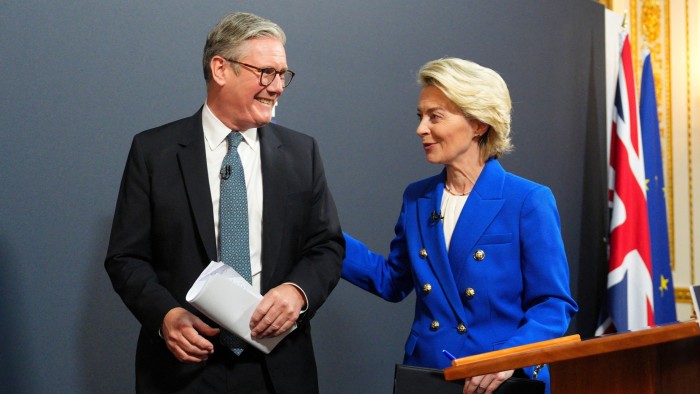Unlock the Editor’s Digest for free
Roula Khalaf, Editor of the FT, selects her favourite stories in this weekly newsletter.
Nine years after the Brexit referendum, the howls of “surrender” from Britain’s political right over the Labour government’s reset with the EU shows how divisive, and cloaked in misinformation, the issue remains. The agreement is not a massive sellout. Neither is it, in sum, a massive deal. It is, though — like the UK’s recent trade pacts with India and the US — a worthwhile step. Its importance is above all symbolic: the first big UK-wide agreement with the EU since Brexit is a recognition that it is in both sides’ interests to work more closely together.
Given the clout of Britain’s military and its defence industry, the centrepiece is rightly a security and defence pact that will formalise co-operation in military training and mobility, cyber and space security, resilience of infrastructure and countering hybrid threats. Subject to signing a third-country agreement, the pact paves the way for the UK to take part in the EU’s €150bn Security Action for Europe procurement fund — an important prize for both sides.
The pressure on Sir Keir Starmer’s government to cut net immigration means it has only reluctantly agreed to work towards a youth mobility scheme enabling 18- to 30-year-olds to travel and work in each others’ countries. Rebadged as a “youth experience” scheme, this would be time-limited and capped in numbers. It is a desirable goal, however, that would reopen important opportunities for young Britons.
The economic component of the reset is more limited. But an agreement to work towards a veterinary deal allowing most UK agrifood exports to the EU to happen without cumbersome border checks and paperwork delivers a Labour manifesto commitment. Combined with linking the two sides’ emissions trading systems, the government estimates this will boost Britain’s economy by nearly £9bn by 2040, even if this offsets only a tiny fraction of the overall hit to the economy from Brexit.
There are, though, notable trade-offs. Britain is accepting “dynamic alignment”, or automatically following evolving EU rules on plant and animal products, with the European Court of Justice acting as final arbiter here on points of EU law. It is giving EU fishing boats access to UK waters for 12 more years — more than double its original offer.
Rightwing opposition parties say Britain is thus becoming a rule-taker, betraying key parts of its post-Brexit “independence” and selling out its fishing industry. Yet the vaunted benefits of regulatory divergence from the EU have mostly proved illusory, and the veterinary deal was worth doing. While fishing looms large in the national psyche, it constitutes, on 2021 figures, a mere 0.03 per cent of national output.
When Europe is having to shoulder much more of its own defensive burden even as Russia poses an ominous threat, it is regrettable that several EU countries chose to make progress in weightier areas such as defence contingent on UK concessions in such a small industry. But the reality is that as soon as it left the EU, especially via Boris Johnson’s bare-bones Brexit deal, Britain became a demandeur in any future attempt to improve its terms. Contrary to Brexiters’ claims, the smaller party in any trade negotiation always needs the bigger one more than vice versa.
Labour arguably wasted some of the post-election goodwill it enjoyed last year in Brussels, through the paucity of its own ambition and its manifesto red lines insisting on no return to the EU single market, customs union or freedom of movement. Its new reset at least attempts to push up to the limits of some of those red lines. Starmer’s government must now use it as the basis for a more ambitious realignment, over time, with what is still Britain’s most important trade and security partner.




